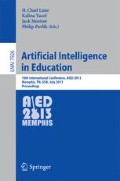Abstract
We report on two studies that suggest that showing reports of student progress at key moments of deactivating negative emotions (boredom or lack of excitement) can help improve students’ affective state and learning behavior while using an adaptive math tutoring system. The studies involved 160 middle-school students in public schools in Arizona and California who reported higher levels of interest and excitement and also demonstrated more positive engagement behavior when using the intervention progress pages.
Access this chapter
Tax calculation will be finalised at checkout
Purchases are for personal use only
Preview
Unable to display preview. Download preview PDF.
References
Arroyo, I., Cooper, D.G., Burleson, W., Woolf, B.P., Muldner, K., Christopherson, R.: Emotion sensors go to school. In: Proceedings of the 14th International Conference on Artificial Intelligence in Education, pp. 17–24 (2009)
Arroyo, I., Ferguson, K., Johns, J., Dragon, T., Meheranian, H., Fisher, D., Barto, A., Mahadevan, S., Woolf, B.P.: Repairing disengagement with non-invasive intervention. In: Proceedings of the 13th International Conference on Artificial Intelligence in Education, pp. 195–202 (2009)
Baker, R., D’Mello, S., Rodrigo, M., Graesser, A.: Better to be frustrated than bored: The incidence, persistence, and impact of learners’ cognitive-affective states during interactions with three different computer-based learning environments. International Journal of Human-Computer Studies 68(4), 223–241 (2010)
Bull, S.: Preferred features of open learner models for university students. In: Cerri, S.A., Clancey, W.J., Papadourakis, G., Panourgia, K. (eds.) ITS 2012. LNCS, vol. 7315, pp. 411–421. Springer, Heidelberg (2012)
D’Mello, S., Graesser, A.: Language and discourse are powerful signals of student emotions during tutoring. IEEE Transactions on Learning Technologies (2012)
Pekrun, R., Goetz, T., Daniels, L., Stupinsky, R., Perry, R.: Boredom in achievement settings: exploring control–value antecedents and performance outcomes of a neglected emotion. Journal of Educational Psychology 102(3), 531–549 (2010)
Verpoorten, D.: A first approach to Learning Dashboards in formal learning contexts (2011), dspace.learningnetworks.org
Author information
Authors and Affiliations
Editor information
Editors and Affiliations
Rights and permissions
Copyright information
© 2013 Springer-Verlag Berlin Heidelberg
About this paper
Cite this paper
Rai, D. et al. (2013). Repairing Deactivating Negative Emotions with Student Progress Pages. In: Lane, H.C., Yacef, K., Mostow, J., Pavlik, P. (eds) Artificial Intelligence in Education. AIED 2013. Lecture Notes in Computer Science(), vol 7926. Springer, Berlin, Heidelberg. https://doi.org/10.1007/978-3-642-39112-5_115
Download citation
DOI: https://doi.org/10.1007/978-3-642-39112-5_115
Publisher Name: Springer, Berlin, Heidelberg
Print ISBN: 978-3-642-39111-8
Online ISBN: 978-3-642-39112-5
eBook Packages: Computer ScienceComputer Science (R0)

